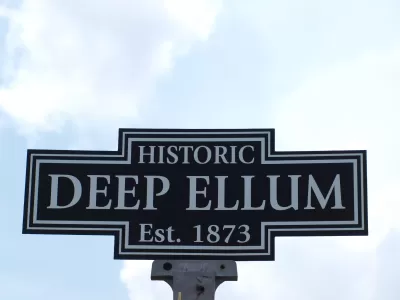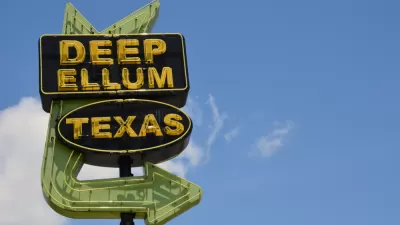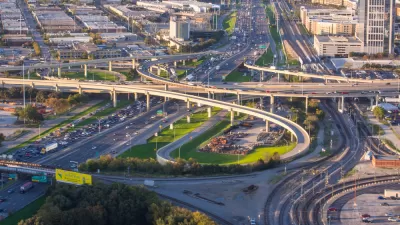A proposal to bury part of Interstate 345 in a 65-foot trench is the latest in a debate that has lasted more than ten years as the freeway reaches the end of its useful life.

The transportation director of the North Central Texas Council of Governments is asking the Dallas City Council to support a plan to bury a segment of Interstate 345 in what Strong Towns recently called an ‘infrastructure grave,’ “which would allow traffic to flow and development to come on decks over the roadway and on surplus right of way.” Critics of the plan say removing the freeway altogether is the best way to begin redressing the damage that the roadway originally caused to surrounding neighborhoods.
As Matt Goodman explains in D Magazine, “The trench would maintain the highway’s present ties to Central Expressway, Woodall Rodgers, and interstates 30 and 45. But it would also create a huge chasm between downtown and Deep Ellum, which makes some on the City Council nervous,” particularly as neither TxDOT nor the city have a plan for funding decking over the trench that could hold future development such as parks or housing. TxDOT insists a proposed plan to replace the freeway with a boulevard would create too much congestion and does not plan to continue studying the boulevard proposal.
The article details the city’s recent growth patterns and the role of I-345 in connecting the southern and northern parts of Dallas, as well as the decade-long debate over how to redesign the aging freeway. According to Goodman, the city council will vote on a resolution to support the trenching project on May 24, which could speed up or delay the project depending on the outcome.
FULL STORY: Transportation Officials Make Public Plea to Support I-345 Trenching Plan

Planetizen Federal Action Tracker
A weekly monitor of how Trump’s orders and actions are impacting planners and planning in America.

Map: Where Senate Republicans Want to Sell Your Public Lands
For public land advocates, the Senate Republicans’ proposal to sell millions of acres of public land in the West is “the biggest fight of their careers.”

Restaurant Patios Were a Pandemic Win — Why Were They so Hard to Keep?
Social distancing requirements and changes in travel patterns prompted cities to pilot new uses for street and sidewalk space. Then it got complicated.

Platform Pilsner: Vancouver Transit Agency Releases... a Beer?
TransLink will receive a portion of every sale of the four-pack.

Toronto Weighs Cheaper Transit, Parking Hikes for Major Events
Special event rates would take effect during large festivals, sports games and concerts to ‘discourage driving, manage congestion and free up space for transit.”

Berlin to Consider Car-Free Zone Larger Than Manhattan
The area bound by the 22-mile Ringbahn would still allow 12 uses of a private automobile per year per person, and several other exemptions.
Urban Design for Planners 1: Software Tools
This six-course series explores essential urban design concepts using open source software and equips planners with the tools they need to participate fully in the urban design process.
Planning for Universal Design
Learn the tools for implementing Universal Design in planning regulations.
Heyer Gruel & Associates PA
JM Goldson LLC
Custer County Colorado
City of Camden Redevelopment Agency
City of Astoria
Transportation Research & Education Center (TREC) at Portland State University
Camden Redevelopment Agency
City of Claremont
Municipality of Princeton (NJ)





























